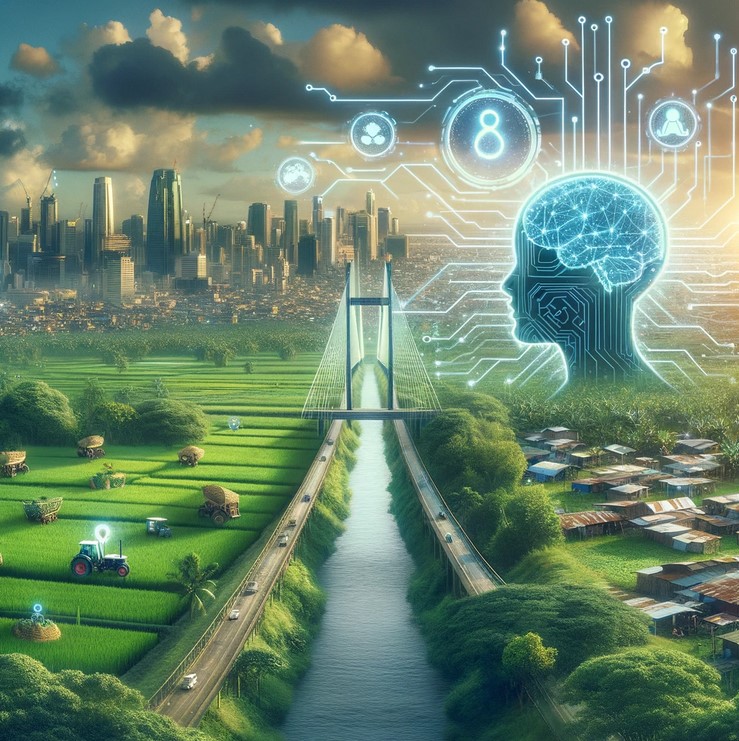FROM SILICON CHIPS TO ECONOMIC SHIFTS
(MSFT), (IBM), (SAP), (GOOGL)
Let's take a whirlwind tour of the AI landscape, but with a twist – we're looking at it through the lens of global economics.
Imagine two worlds: one, where countries like the U.S. and Denmark are throwing a swanky party for AI, rolling out the red carpet and popping champagne.
Then there's the other world, the one that's not on the guest list. We're talking about low-income countries, where introducing AI feels more like hiking uphill with a backpack full of bricks.
Here's a number that blew my mind: according to the World Bank, 3.7 billion people are still not online. This isn't just a gap; it's like the Grand Canyon of the digital world, and it's putting a major damper on the whole AI fiesta.
But don't lose hope yet. We've got some big players stepping up to the plate, ready to knock this digital divide out of the park. Initiatives like Artificial Intelligence for Development (AI4D) are cropping up, aiming to sprinkle a bit of AI magic in neighborhoods that need it most.
Take Microsoft (MSFT), for example. They're not just dipping their toes in; they're diving in headfirst with their AI for Good projects.
Think Project Red, using AI to protect wildlife and map diseases – it's like giving Mother Nature her own superhero suit. They're covering a whopping 800,000 square kilometers of wildlife habitat in Africa. And that's just the beginning.
Then there's the m-Tulip project, helping Kenyan farmers bump up their maize yields by a nifty 20% with AI-driven weather forecasts. Who knew AI could be a farmer's new best friend?
Let's not forget about AI for Climate Action. These guys are on a mission to cut greenhouse gas emissions by a whopping 5 billion tons by 2030. That's like taking a billion cars off the road.
Microsoft's also pouring $44 million into 31 projects across Africa with the 4Africa Initiative and offering discounted Azure services to over 85,000 nonprofits and academic institutions globally through Cloud for Good.
And get this: they're aiming to bring internet access to 25 million people in Africa by 2025 with the Airband Initiative.
But it's not just Microsoft in this AI-for-good crusade. IBM (IBM) is also throwing their hat in the ring with projects like Watson for Development and AI for Climate.
These aren't just small-time projects; they're helping manage water resources in over 15 countries and boosting agricultural yields for 120,000 farmers in India by 30%. Talk about AI being a game-changer for the green thumbs.
IBM's also got some cool stuff like Project Air-Locate, sniffing out methane emissions with AI and satellite data, and the One Planet AI Network, rallying the troops for climate action AI solutions. Their Environmental Intelligence Suite is also handing out AI tools to businesses to be more resource-savvy and environmentally friendly.
Now, let's pivot to SAP SE (SAP). They're rolling out AI-powered solutions for agriculture and disaster management in developing countries – showing that AI can indeed be a force for good.
Meanwhile, Alphabet Inc. (GOOGL), Google's parent company, is making waves with a $1 billion investment in Africa. This is big – like nearly 1% of their 2023 market cap big. They're betting big on Africa's digital future, spread across five years.
Google isn't just throwing money around; they're building bridges. By providing affordable access and developing localized tools, they're eyeing an extra $180 billion for the African internet economy by 2025. That's like finding a treasure chest at the end of a rainbow.
Alphabet's cloud services are set to be a game-changer for African businesses, ramping up their productivity and competitiveness. This isn't just a business move; it's a strategic play to be at the forefront of Africa's digital revolution.
The upcoming Google Cloud region in South Africa? It's more than just a new office. It's a commitment to the continent, expected to add $2.1 billion to South Africa's GDP and create over 40,000 jobs by 2030.
And here's the cherry on top: supporting nonprofits using AI for healthcare, education, and agriculture isn't just for good PR; it's genuinely making a difference in people's lives.
So, while some might see the AI race as a solo sprint, for developing countries, it's turning into a relay race, with these tech giants passing the baton.
It's a win-win: the countries get a digital leg up, and the companies expand their global footprint. Now that's what I call playing the AI game with style on the global stage.
For all you investors and AI enthusiasts out there, here's the deal: the future of AI isn't just in the tech hubs; it's happening in fields, classrooms, and communities worldwide. This is an invitation to be part of this transformation, to invest not just in technology, but in a vision of a more connected, empowered world. Let's not just be spectators; let's jump into the game and make a difference.

